Praise for
The Chief Development Officer
With The Chief Development Officer: Beyond Fundraising, Ronald J. Schiller debunks stereotypes and assumptions about good development leaders and shares characteristics of the most successful chief development officers based on real-life experience and interviews. This should be required reading for any CEO or board chair hiring a new CDO and for any aspiring development officer who thinks he or she wants the job. Elizabeth Boluch Wood, vice president for development, Princeton University
The role of the chief development officer has expanded greatly over the past two decades, and Ron Schiller draws on his experience as a CDO and extensive research to offer sound advice to those taking on that role and those hiring a CDO. His examples of how CDOs excel or fall short can assist nonprofit organizations in making wise choices when it comes to filling this crucial position. Robert J. Zimmer, president, University of Chicago
Schiller has remarkable insight into the role of the chief development officer and cuts right through the rhetoric to get to the core of what leads to success. Jerry May, vice president for development, University of Michigan
The Chief Development Officer
Beyond Fundraising
Ronald J. Schiller
ROWMAN & LITTLEFIELD EDUCATION
A division of
ROWMAN & LITTLEFIELD
Lanham Boulder New York Toronto Plymouth, UK
Published by Rowman & Littlefield Education
A division of Rowman & Littlefield
4501 Forbes Boulevard, Suite 200, Lanham, Maryland 20706
www.rowman.com
10 Thornbury Road, Plymouth PL6 7PP, United Kingdom
Copyright 2013 by Ronald J. Schiller
All rights reserved. No part of this book may be reproduced in any form or by any electronic or mechanical means, including information storage and retrieval systems, without written permission from the publisher, except by a reviewer who may quote passages in a review.
British Library Cataloguing-in-Publication Information Available
Library of Congress Cataloging-in-Publication Data Available
Schiller, Ronald J.
The chief development officer : beyond fundraising / by Ronald J. Schiller.
p. cm.
ISBN 978-1-61048-934-8 (cloth : alk. paper) ISBN 978-1-61048-935-5 (pbk. : alk. paper) ISBN 978-1-61048-936-2 (electronic)
 TM The paper used in this publication meets the minimum requirements of American National Standard for Information Sciences Permanence of Paper for Printed Library Materials, ANSI/NISO Z39.48-1992.
TM The paper used in this publication meets the minimum requirements of American National Standard for Information Sciences Permanence of Paper for Printed Library Materials, ANSI/NISO Z39.48-1992.
Printed in the United States of America
Foreword
A new president is selected, begins to settle into her office, and starts formulating the priorities that will launch her term with hope and excitement. She quickly learns, upon deeper examination, where, unbeknownst to her, additional strengths lie; she also realizes, inevitably, where the soft spots are softer than at first apparent. These revelations alter the areas demanding her early attention, changing the list substantially. Quickly, an assessment of the quality of advancement comes under her lens because she knows she must consider, organize, and then commence a capital campaign if the aspirations of the institution are to become attainable. Many times, in these circumstances, the decision to seek new leadership is made and the search process begins.
Ron Schillers book is not a blueprint for how to conduct a search. Rather, it is an in-depth discussion of what to look for in a chief development officer, who must be not only a trusted colleague, but also an effective thought leader, an organizational expert, a psychologist, a cheerleader, a mentor, and a magnet for talent and potential talent, all applied with the optimism of a rookie and the wisdom of a veteran.
As I read it, the objective of this book is to elevate the entire profession by eliminating missteps that organization after organization seem to make. In todays world, an erroneous selection can mean a decade of decline that will take another decade to reverse.
There are many how-to books on the mechanics of fundraising, and they make important contributions. However, one of the revealing tendencies Ron has discovered through extensive interviews with presidents and trustees is that the majority of firings of chief development officers are not due to an inability to raise money. The changes are made because of an inability to relate effectively to the many, many constituencies within and outside the institution. As Ron points out, the very first on that list is the chemistry between the chief development officer and the president. Success here depends on the soft skills that determine how we come across to those we meet and want to make stakeholders in our institutions. Steven M. C. Covey wrote a book entitled TheSpeedofTrust:TheOneThingThatChangesEverything. It takes us partway in developing the understanding we seek, a very valuable contribution. Rons book builds on the premises I found in Coveys book in that it applies the principles specifically to the world of development.
Let me suggest an example from my own experience. When asking each person in a group to give a one-word description of someone he or she admires greatly, we learn something about how we may be perceived. Let us say there are 30 people in the group and each of their words is written on a board and then put into one of three categories: a gift, a learned skill, or an attitude. A gift might be that a basketball player is seven feet tall, a learned skill would be that he can go either left or right with equal effectiveness, and an attitude is that he seeks to be supportive of his teammates at all times.
Some of the words we hear are respectful, kind, trustworthy, affirming, encouraging, supportive, fair, genuine, caring, thoughtful, perceptive, or attentive. When we place the descriptors into our categories, I have found that at least 75 percent are in the attitude column. They are what I call soft skills as contrasted with the learned skills of the basketball player.
Rons book is filled with insights on how we might judge in advance whether a person can cope and make contributions in discussions representing multiple demands from multiple constituencies in multiple settings. It also contains insights on how long-term relationships are built, the relationships that result in lifelong support of our institutions while building trust within the academic community.
This work adds a dimension of understanding of the demands of the development profession I have never seen articulated in my 40-plus years of engagement in our work. I will suggest it to presidents, to trustees, to every search committee, and to every professional who believes advancement is his or her path to a satisfying life of work.
Curtis R. Simic
President Emeritus, Indiana University Foundation
Preface
TheChiefDevelopmentOfficer:BeyondFundraising draws on my experience in the roles of chief development officer (CDO), board member, and fundraising consultant. It also draws on my current work with chief executive officers (CEOs) and other nonprofit leaders in my role as founding partner of the Aspen Leadership Group, a national executive search and consulting firm focused exclusively on the social profit sector.
During 25 years in frontline fundraising and fundraising leadership positions, I saw the role of CDO expand significantly. Through my work in search, I have observed more broadly the impact of this expansion on the success rate and tenure of CDOs. Board members, CEOs, consultants, and development officers all confirmed the need for assistance in understanding how and why the role has evolved and the competencies required for success in the role today.


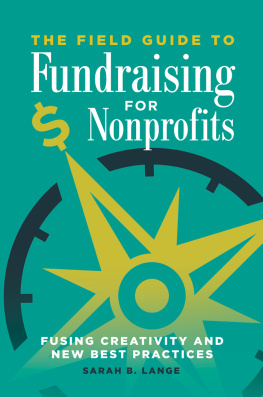

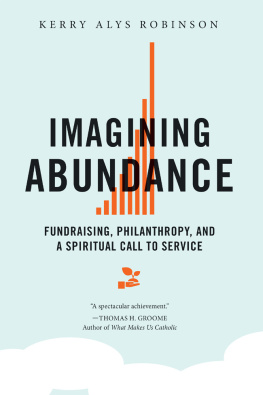
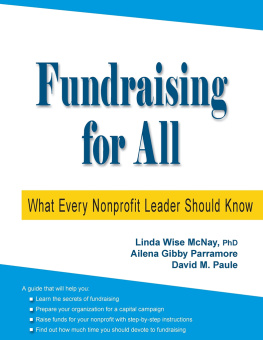

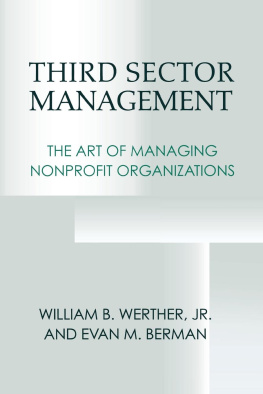
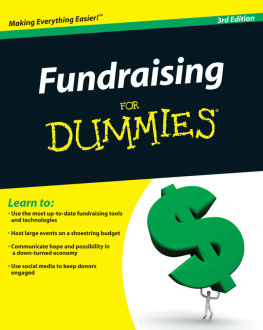
 TM The paper used in this publication meets the minimum requirements of American National Standard for Information Sciences Permanence of Paper for Printed Library Materials, ANSI/NISO Z39.48-1992.
TM The paper used in this publication meets the minimum requirements of American National Standard for Information Sciences Permanence of Paper for Printed Library Materials, ANSI/NISO Z39.48-1992.